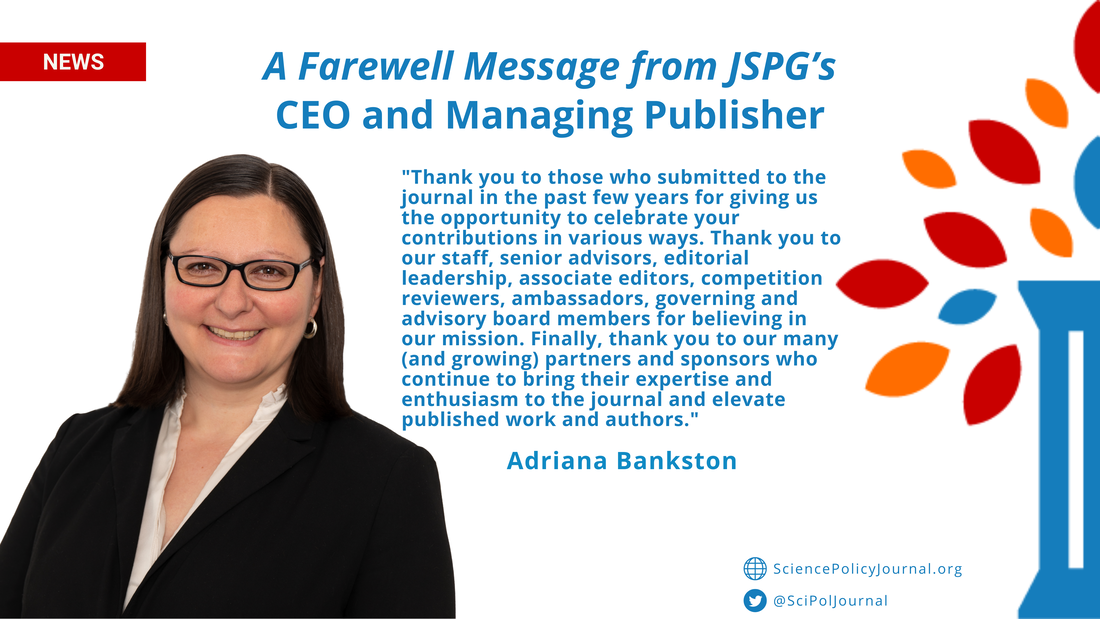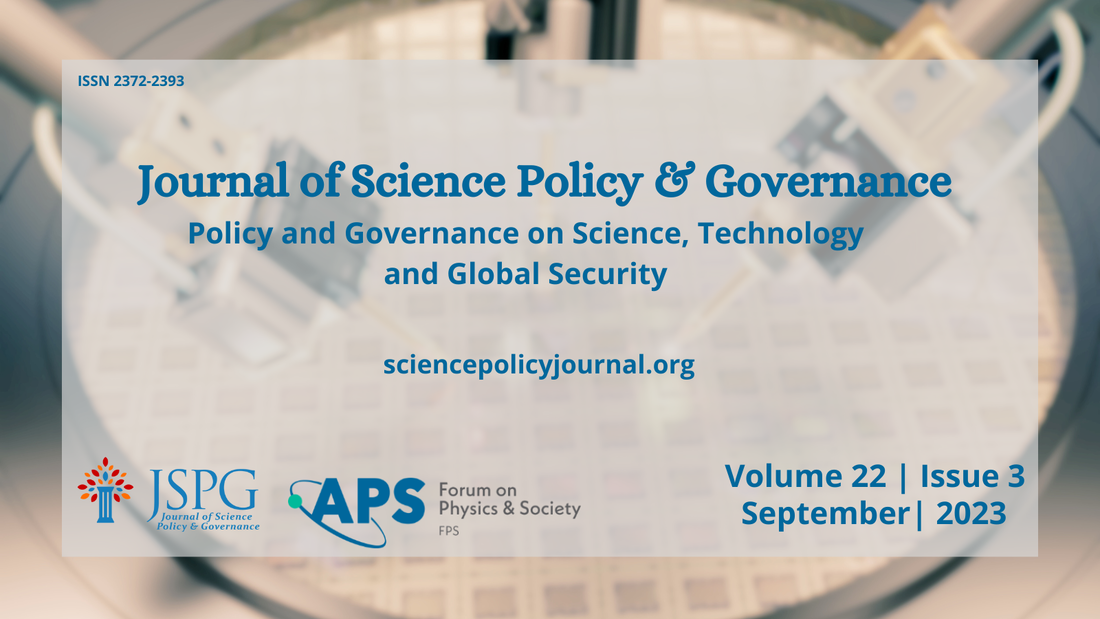|
The beginnings
In 2018, while transitioning into science policy and starting to learn more about the field, I was selected as Director of Communications & Outreach for JSPG. This role proved instrumental in understanding the journal’s communication and public relations, and social media and marketing strategies, which are critical to running a digital publication with global reach. In 2020, I was promoted to JSPG’s Chief Outreach Officer, where I understood the role that outreach played to raise awareness of the journal in relevant science policy circles, target specific communities, and seek opportunities to highlight published authors. In large part, I attribute my success as JSPG CEO to having gained a solid understanding of the critical role that communication and outreach play for publication submissions and highlighting published authors. Still, nothing could have prepared me for the privilege and responsibility I would feel to our authors, editors, ambassadors, advisors and to the entire science policy community, to do well as the third CEO. Building on the foundation Being the CEO of JSPG for the past two years has been a great honor and taught me so much. I am grateful to have worked with fantastic colleagues and advisors, and to learn from those smarter than me, both in terms of policy knowledge and business skills. This role allowed my creative and entrepreneurial personality to flourish, and taught me what servant leadership means. I am thankful to those who came before me for creating this space for the next generation to publish their policy research, and for building a solid foundation upon which to build what will now become my legacy. When I took over as JSPG CEO, the appetite for science policy among the young generation had been steadily growing. Staying true to our mission, I chose to say yes to opportunities that would help the organization grow in specific strategic areas, while continuing to find ways to expand in new directions. I am proud of the achievements we had over the past two years, which exceeded my expectations of what was possible at the start. Taking on the challenge I am grateful for the opportunity to leave a mark on the journal and to shape it based on my own beliefs and desired directions, and for the support I received along the way. This role has become an integral part of my professional identity and gave me a chance to spread my wings, discover what I was capable of, and push a little beyond that every day to see how far we could go. But I did not always have it all figured out. In fact, I almost didn’t apply for the CEO role. It seemed beyond my reach and I didn’t think I could do it well. But I decided to try anyway. The interview process had several rounds. To my surprise, I passed all the rounds and was offered the position. Once in this role, there were times when I didn’t feel brave for having taken it on, or when I didn’t know what the right answer was. I learned to trust my gut and intuition and keep going, to always continue innovating, and to ask for advice from trusted peers and advisors when needed. Examples of growth The journal’s published issues have continued to grow and remain timely and relevant in a number of areas in science policy and governance.
Examples of innovation The journal has expanded nationally and internationally into specific policy spaces through outreach, programs, and innovative partnerships.
Examples of impact These innovative developments allowed us to showcase the policy impact achieved by published authors, including the journal’s alumni and others in the community.
Acknowledgements At the conclusion of my tenure as JSPG CEO, I would like to thank everyone who has supported our mission since the beginning, and those who continue to promote our initiatives. Thank you to those who submitted to the journal in the past few years for giving us the opportunity to celebrate your contributions in various ways. Thank you to our staff, senior advisors, editorial leadership, associate editors, competition reviewers, ambassadors, governing and advisory board members for believing in our mission. Finally, thank you to our many (and growing) partners and sponsors who continue to bring their expertise and enthusiasm to the journal and elevate published work and authors. Future directions As Strategic Advisor for JSPG, I will seek to provide guidance and lend my expertise to support future leadership in the next phase of the journal, while continuing to engage with the broader science policy community. Additionally, I look forward to leveraging the lessons learned and knowledge gained as JSPG CEO to continue growing my own impact and influence in the field through other roles that seek to develop the next generation of leaders in science policy and governance. With much gratitude, Adriana Bankston JSPG CEO & Managing Publisher Media Contacts
American Physical Society (APS) Forum on Physics and Society Henry Kelly [email protected] Journal of Science Policy & Governance Andre Porter [email protected] Washington, DC (September 11, 2023) – The Journal of Science Policy & Governance (JSPG) and the American Physical Society Forum on Physics and Society (APS FPS) are proud to announce the release of Volume 22, Issue 03, the journal’s third Special Topics Issue of 2023, on Policy and Governance on Science, Technology and Global Security. "New technologies are creating a new set of threats to global security and potentially a new set of solutions. The authors of these articles have used their backgrounds in science and engineering to help us understand these new threats and propose a creative array of solutions," said Henry Kelly, Past Chair of the American Physical Society Forum on Physics and Society. In the 7 published articles, authors in Volume 22, Issue 03 of JSPG investigate topics in food system resilience, semiconductor export controls, recommendations for governments to address future technology changes, the impact of counterfeit personal protective equipment supply systems, and evaluating the nuclear command control system’s efficacy in the 21st century. The Special Issue competition, judged by an external review committee, aims to provide writers of the winning articles with opportunities to present published work at events hosted by the APS Forum on Physics and Society. The committee selected Future-proof: Monitoring the development, deployment, and impacts of Artificial Intelligence as the outstanding article winner for the Special Issue. We thank competition reviewers for their efforts and greatly appreciate their input towards selecting the winners: David Hart (George Mason University), Fredrick K. Lamb (University of Illinois at Urbana-Champaign), Morgan Livingston (Tsinghua University), Michael Stebbins (Science Advisors, llc), and Sri Vedachalam (Corvias Infrastructure Solutions). . “National security is a matter of critical importance in science policy today and a highly discussed topic in current times,” said Adriana Bankston, JSPG CEO & Managing Publisher. “JSPG is proud to partner with the American Physical Society Forum on Physics and Society on this special issue and to showcase early career views in policy development and implementation to address national security challenges.” This Special Issue is supported in-kind by outreach partners from the American Physical Society Forum on Early Career Scientists (APS FECS) and the Schar School of Policy and Government, George Mason University. APS is a sponsor and is not responsible for the content of the special issue. ### About JSPG
The Journal of Science Policy & Governance (JSPG) is an international, open-access peer-reviewed publication managed by and for students, policy fellows, and young scholars in science, technology, and innovation policy. JSPG publishes high-quality articles covering the widest range of topics in formats that are accessible to policymakers. Since 2011, JSPG has served as a vehicle for students and early career researchers to bolster their research and writing credentials in science policy. Visit sciencepolicyjournal.org and follow on Twitter @SciPolJournal to learn more. About APS FPS The American Physical Society’s Forum on Physics and Society (FPS) is a forum of the American Physical Society, organized in 1971 to address issues related to the interface of physics and society as a whole. Founded in the late 1960s, FPS has been active in exploring policy issues such as nuclear weapons and nonproliferation, autonomous weapons, environmental challenges, and cybersecurity. It has also been active in exploring ways to encourage equity and inclusion in the physics community. Visit https://engage.aps.org/fps/home to learn more. About APS FECS The APS Forum for Early Career Scientists (FECS) was established in 2016 to enhance APS's ability to meet the needs of early career scientists and promote career path development, as well as foster scientific communication and cooperation between early career scientists working in different fields all over the world. FECS is focused on serving scientists working in the early stages of their careers, especially recent graduates, postdocs, and junior faculty, but welcomes membership from all career stages. Visit https://engage.aps.org/fecs/home to learn more. About the Schar School of Policy and Government at George Mason University George Mason University’s Schar School of Policy and Government prepares undergraduate and graduate students to be leaders and managers who solve problems and advance the public good in all sectors and levels of government—in the United States and throughout the world. Located where policy happens—just 3 miles from the Pentagon, 4 miles from the White House, and 6 miles from the U.S. Capitol Building—students are connected to jobs, internships, networking, and experiences that can only be found in the Washington, D.C., area. Visit see: https://schar.gmu.edu and follow on Twitter @ScharSchool to learn more. |
JSPG NewsAll the latest news from the Journal of Science Policy & Governance. Archives
April 2024
Categories
All
|
- Home
- About
-
Volumes
- Volume 24 Issue 01
- Sigma Xi and Rita Allen Foundation - Civic Science for Transformative Policy Solutions to Societal Challenges
- Volume 23 Issue 01
- APS Policy and Governance on Science, Technology and Global Security
- IAI Development Policy and Global Change Science to Achieve the Vision of Sustainable Americas
- Volume 22 Issue 01
- GHFUTURES2030 Strengthening Youth-centered Policy and Governance of Digital Transformations in Health.
- UNESCO AND MGCY OPEN SCIENCE POLICIES AS AN ACCELERATOR FOR ACHIEVING THE SUSTAINABLE DEVELOPMENT GOALS
- Volume 21 Issue 01 >
- JSPG and UCL STEAPP Special Topics: Innovations in Science Diplomacy >
- Sigma XI-JSPG Special Issue: Re-envisioning STEM Education and Workforce Development for the 21st Century
- Volume 20 Issue 01
- JSPG Volume 19 Issue 01 (10 Years of Publishing)
- Special Issue: 2021 NSPN-JSPG Policy Memo Competition
- Special Issue: Shaping the Future of Science Policy
- JSPG-UK SIN Special Issue: Climate Change Solutions
- Volume 18 Issue 01
- Special Issue: 2020 NSPN-JSPG Policy Memo Competition
- Volume 17 Issue 01 (Supported by AAAS STPF)
- JSPG-UN MGCY Special Issue: Impacts of Emerging Technologies
- Volume 16 Issue 01
- Volume 15 (Supported by CSPC)
- Special Issue: 2019 NSPN-JSPG Policy Memo Competition
- Volume 14
- Volume 13
- Volume 12
- Volume 11
- Volume 10
- Volume 9
- Volume 8
- Volume 7
- Volume 6
- JSPG-UCS Special Issue: Healthy Food Policy
- Volume 5
- Volume 4
- Special Issue: Hot Topics 2013
- Volume 3
- Volume 2
- Volume 1
- Submit to JSPG
- Announcements
- Events
- Training
- Media Mentions
- Policy in action
- Podcast



 RSS Feed
RSS Feed
